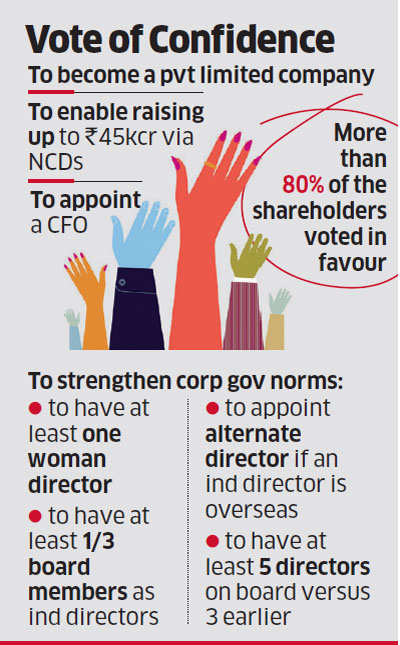By Megha Mandavia



MUMBAI: Shareholders of Tata Sons, the holding company of the $103-billion Tata group, voted in favour of turning it into a private limited company despite vehement opposition from ousted chairman Cyrus Mistry’s family firms that own a minority stake. This will mean that Mistry’s Shapoorji Pallonji group won’t be able to sell its minority stake in Tata Sons without board approval.
The stakeholders also voted to amend the articles of association to strengthen corporate governance norms, including the appointment of a woman director and having a board in which at least a third are independent directors. They also approved the appointment of an alternate director if an independent director is overseas.
Board Strength
Also approved was a resolution raising the minimum board strength to five from three while the maximum remains at 15. Other resolutions passed include approval to raise as much as Rs 45,000 crore through non-convertible debentures (NCDs) and the appointment of a chief financial officer.

The Tata Trusts, a group of charitable organisations headed by chairman emeritus Ratan Tata, own 66% of Tata Sons, while the Mistry family firms own about 18.4%. The rest is held by Tata group companies and some Tata family members.
The Tata Trusts were backed by the family members, including Noel Tata and his mother Simone Tata. Noel Tata, incidentally, is Cyrus Mistry’s brother-in-law. Mistry stayed away from the AGM, but sent two proxies, who opposed most of the resolutions barring those on dividends and the appointment of auditors.
“We opposed the ones we thought were not in the interest of minority shareholders,” said a source close to Mistry.
Noel Tata and his children are associated with the Tata operating companies and the support was on expected lines. On the last occasion, the Minoo Tata group had abstained from voting. This time, they gave proxies in favour of the Tata Sons management.
Thursday’s Tata Sons annual general meeting was the first under the chairmanship of N Chandrasekaran, who was appointed in February.
Mistry has been opposed to Tata Sons becoming a private limited company from a public a public one, arguing that the move will restrict his family’s rights to transfer or sell shares. Under the Companies Act, 2013, shares of a public limited company are freely transferrable unlike those of private ones, which need board approval before any change of hands.
The former Tata Sons chairman had even written to the boards of group companies such as Tata MotorsBSE , Tata Power, Tata Steel, Tata Chemicals, Tata Global Beverages and Indian Hotels that own shares in the holding company in a bid to persuade them to vote against the proposals.
Tata Sons was incorporated as a private limited company on November 8, 1917, under the Indian Companies Act 1913. Mistry’s family first invested in Tata Sons in 1965. It became a deemed public company with effect from May 1, 1975, because of a change in the Companies Act. Since the Companies Act, 2013, came into effect, Tata Sons had the option to become a private limited company
Incidentally, the Shapoorji Pallonji group had also converted two companies — United Motors and SP Finance — from public limited to private. But people close to Mistry said this wasn’t comparable.
“Tata Sons is the largest holding company in India with many operating companies controlled by it,” said one of them. United Motors is over 90% owned by the family and is only a property holding company and SP Finance is a small, internal, non-banking finance company fully owned by the family and is only a property holding company and SP Finance is a small, internal, non-banking finance company fully owned by the group, the person said.
Some corporate governance experts said the proposal to become a private limited company is not oppression of minority shareholders as alleged by Mistry. JN Gupta, managing director of Stakeholders Empowerment Services (SES), a proxy advisory firm, said that the Tata Sons articles of association already restricted the free transfer of shares, which overrides the rules of the Companies Act pertaining to a public limited company.
Mistry is looking to challenge the move, calling it a “weapon” to oppress minority shareholders. The Mistry family firms are already entangled in a legal battle against Tata Sons, alleging mismanagement and oppression of minority shareholders’ rights. The case was filed in December last year after Mistry was removed as chairman in October in a surprise move that sparked a boardroom battle.
The ousted chairman won a partial reprieve on Thursday as the National Company Law Appellate Tribunal (NCLAT) granted a legal waiver to his family firms related to the filing of the case against Tata Sons despite insufficient shareholding in the holding company.
No comments:
Post a Comment